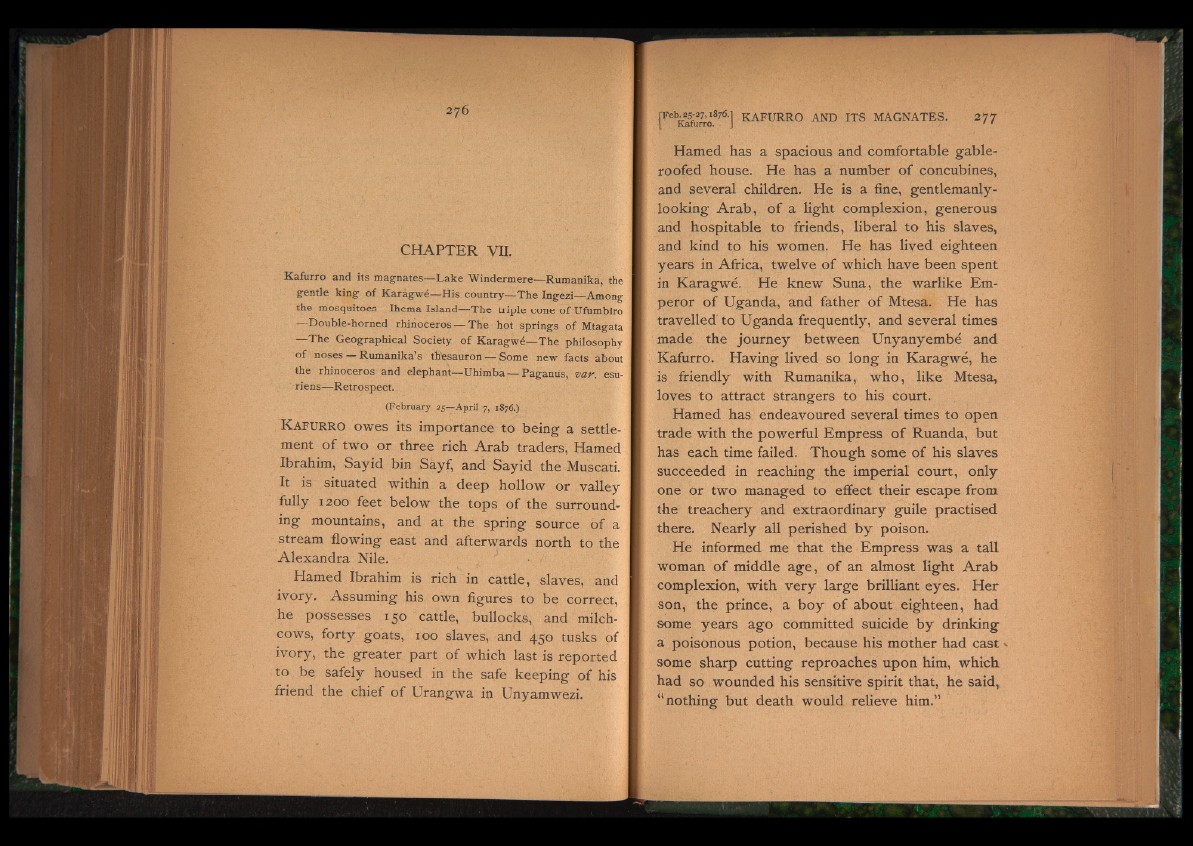
CH A P TER VII.
Kafurro and its magnates—Lake Windermere— Rumanika, the
gentle king of Karagwe— His country— The Ingezi— Among
the mosquitoes— Ihema Island— The triple cone of Ufumbiro
— Double-horned rhinoceros — The hot springs of Mtagata
— The Geographical Society of Karagwe—The philosophy
of noses — Rumanika’s thesauron— Some new facts about
the rhinoceros and elephant— Uhimba— Paganiis, vay. esu-
riens— Retrospect.
(February 25— April 7, 1876.)
K a f u r r o owes its importance to being a settlement
o f two or three rich Arab traders, Hamed
Ibrahim, Sayid bin Sayf, and Sayid the Muscati.
It is situated within a deep hollow or valley
fully 1200 feet below the tops o f the surround-
ing mountains, and at the spring source o f a
stream flowing east and afterwards north to the
Alexandra Nile.
Hamed Ibrahim is rich in cattle, slaves, and
ivory. Assuming his own figures to be correct,
he possesses 150 cattle, bullocks, and milch-
cows, forty goats, 100 slaves, and 450 tusks of
ivory, the greater part o f which last is reported
to be safely housed in the safe keeping o f his
friend the chief o f Urangwa in Unyamwezi.
Hamed has a spacious and comfortable gable-
roofed house. He has a number o f concubines,
and several children. He is a fine, gentlemanly-
looking A rab, o f a light complexion, generous
and hospitable to friends, liberal to his slaves,
and kind to his women. He has lived eighteen
years in Africa, twelve o f which have been spent
in Karagwe. He knew Suna, the warlike Emperor
o f Uganda, and father o f Mtesa. He has
travelled to Uganda frequently, and several times
made the journey between Unyanyem.be and
Kafurro. Having lived so long in Karagwe, he
is friendly with Rumanika, who, like Mtesa,
loves to attract strangers to his court.
Hamed has endeavoured several times to open
trade with the powerful Empress o f Ruanda, but
has each time failed. T h ou gh some o f his slaves
succeeded in reaching the imperial court, only
one or two managed to effect their escape from
the treachery and extraordinary guile practised
there. Nearly all perished b y poison.
He informed me that the Empress was a tall
woman o f middle a g e , o f an almost light A rab
complexion, with v e ry large brilliant eyes. Her
son, the prince, a b o y o f about eighteen, had
some years ago committed suicide b y drinking
a poisonous potion, because his mother had cast *
some sharp cutting reproaches upon him, which
had so wounded his sensitive spirit that, he said,
“ nothing but death would relieve him.”